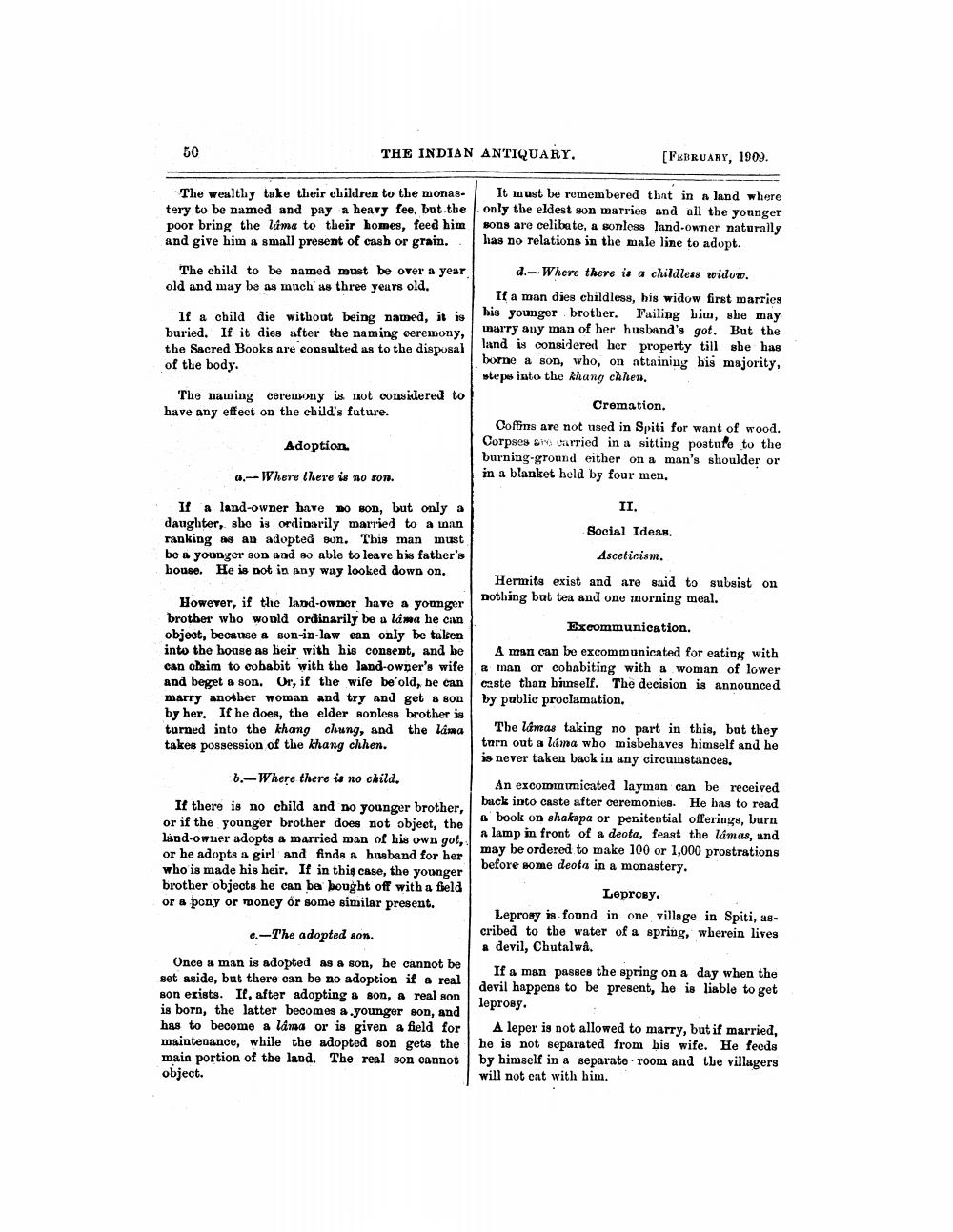________________
50
THE INDIAN ANTIQUARY.
[FEBRUARY, 1909.
The wealthy take their children to the monastery to be named and pay a heavy fee, but the poor bring the láma to their homes, feed him and give him a small present of cash or grain.
It must be remembered that in land where only the eldest son marries and all the younger sons are celibate, a sonless land-owner naturally has no relations in the male line to adopt.
The child to be named must be over a year old and may be as much as three years old.
If a child die without being named, it is buried. If it dies after the naming ceremony, the Sacred Books are consulted as to the disposal of the body.
d. - Where there is a childless ridor. If a man dies childless, bis widow first marries his younger brother. Failing bim, she may marry any man of her husband's got. But the land is considered her property till she has borne a son, who, on attaining his majority, steps into the khang chhen.
The naming ceremony is not oonsidered to have any effect on the child's future.
Adoption.
Cremation. Coffins are not used in Spiti for want of wood. Corpses irried in a sitting posture to the burning.ground either on a man's shoulder or in a blanket held by four men,
a.-- Where there is no son.
IL.
11 a land owner have no son, but only a daughter, she is ordinarily married to a man ranking in an adopted sun. This man must be a younger son and so able to leave his father's house. He is not in any way looked down on.
Social Ideas.
Asceticism. Hermits exist and are suid to subsist on nothing but tea and one morning meal.
However, if the land-owner have a younger brother who would ordinarily be a lama he can object, because a son-in-law can only be taken into the house as beir with his consent, and be can ohim to cobabit with the land owner's wife and beget a son. Or, if the wise be old, be can
Excommunication. A man can be excommunicated for eating with a man or cohabiting with a woman of lower easte than binself. The decision is announced by public proclamation.
by her. If he does, the elder sonless brother is turned into the khang chung, and the lama takes possession of the khang chhen.
The lamas taking no part in this, but they turn out a lima who misbehaves himself and he is never taken back in any circumstances,
b.- Where there is no child.
If there is no child and no younger brother, or if the younger brother does not object, the lind-owner adopts a married man of his own got, or he adopts a girl and finds a husband for her who is made his heir. If in this case, the younger brother objects he can be bought off with a feld or a pony or money or some similar present.
An excommumicated layman can be received back into caste after ceremonies. He has to read a book on shakapa or penitential offerings, burn a lamp in front of a deota, feast the lamas, and may be ordered to make 100 or 1,000 prostrations before some deota in a monastery.
c.-The adopted son. Once a man is adopted as a son, he cannot be set aside, but there can be no adoption if a real Bon exists. Il, after adopting a son, & real son is born, the latter becomes a younger son, and has to become a lama or is given a field for maintenance, while the adopted son gets the main portion of the land. The real son cannot object.
Leprosy. Leprosy is found in one village in Spiti, ascribed to the water of a spring, wherein lives a devil, Chutalwa.
If a man passes the spring on a day when the devil happens to be present, he is liable to get leprosy,
A leper is not allowed to marry, but if married, he is not separated from his wife. He feeds by himself in a separate room and the villagers will not eat with him.




